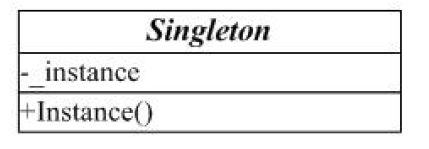【2013.1.16】真相永远只有一个——Singleton
// // // // // // // // //
///2013.1.16
// // // // // // // // //
如果说评选一个最简单的设计模式的话,
Singleton当之无愧。
【核心】利用static使类与对象一一对应,并将类的构造函数私有化。
但单纯的外表下是Singleton强大的灵魂。
这一点童鞋们也能从今年的面向对象考试题中看出来(填空第一题就写Singleton…)。
在实际的编程应用中也不乏其拥有明显特征的代码身影。
最简单的例子,
就是假设我们创建一个类叫做HumanPlanet,那么应该只有一个名为Earth的实例。
值得一提的是,
这个模式在Java中是非常重要的,
因为在纯面向对象的范式中,是不可以使用static的。
还有很多人因为这个模式易用所以开始滥用,
但首先要注意两点:
1.使用单例不一定会节省内存。因为它的生命周期是Forever Until u delete it by yourself.
2.在需要扩展的结构当中,尽量不要使用单例,原因很简单,static容易扩展么?
接下来是示例代码。
HumanPlanet.h
#ifndef _HUMAN_PLANET_H_
#define _HUMAN_PLANET_H_
class HumanPlanet
{
private:
static HumanPlanet* earth;
protected:
//Constructor couldn't be accessed from outside.
HumanPlanet(){}
public:
static HumanPlanet* GetHumanPlanet();
//This function only used to test this class is exist.
void saySomething();
};
#endif
#include"HumanPlanet.h"
#include<iostream>
//Initial static variable before use it.
HumanPlanet* HumanPlanet::earth = 0;
HumanPlanet* HumanPlanet::GetHumanPlanet()
{
if(earth == nullptr)
earth = new HumanPlanet();
return earth;
}
void HumanPlanet::saySomething()
{
std::cout<<"Only one earth,please love and protect this beautiful planet."<<std::endl;
return;
}
main.cpp
#include "HumanPlanet.h"
int main()
{
HumanPlanet* planet = HumanPlanet::GetHumanPlanet();
planet->saySomething();
return 0;
}
![]()
最后需要注意的是,
在c++中不可以直接使用静态函数的返回值来do something.(And i knew this point after i programming this example...)
